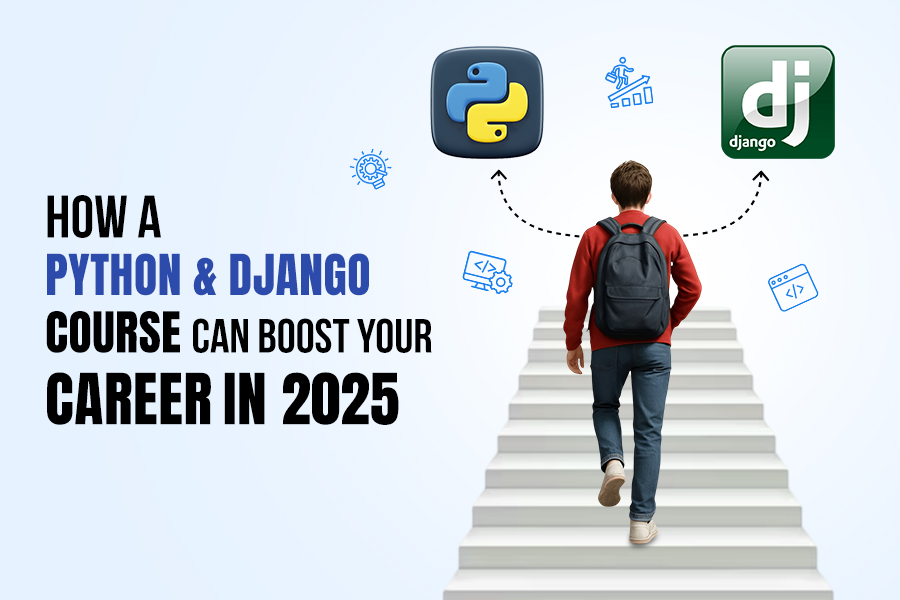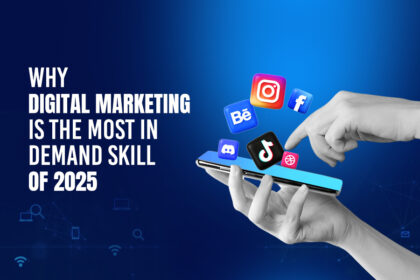
How a Python & Django Course Can Boost Your Career in 2025
Are you considering taking a Python & Django course, and wondering if it is worth it? We get it, there are just so many IT courses floating around out there it is impossible to know what actually makes a difference.
In 2025, the world of technology is not slowing down. Companies are constantly looking out for professionals who can create and manage apps and websites. What distinguishes Python & Django tech is that they in high demand. This pair of technologies is now driving a lot of web platforms, and the need for developers who are familiar with them just continues to increase.
A Python & Django course from a top institute can provide you with actual, applicable skills within a matter of months. You don’t need to spend years earning a degree. You don’t even need to have a technical education. The course trains you from the ground up to create robust web applications. So yes, if you are serious about a career change or a chance to use your degree, this course is well worth your time.
What is Python & Django?
To understand why a Python & Django course is so effective, it is helpful to first understand what Python and Django are.
Python is a versatile programming language well-known for its simple syntax, readability, and versatility. It enables you to create web applications, automate processes, perform data analysis, and even create AI models. No wonder it’s a sought-after and popular technology today.
Django is a framework based on Python. It is a pre-built toolkit that simplifies and accelerates web development. While Python provides the foundation, Django supplies the structure to build complete, functioning websites and apps. It handles back-end work like database management, user authentication, and URL routing. You get to avoid these tasks that involve writing lots of complicated code from scratch.
The combination is really strong. Python is simple and easy to read, and Django ensures you work efficiently and securely. That is why a Python & Django course is meant to teach both tools simultaneously. You learn to code and also learn to implement real-world web solutions using it.
In practical terms, knowing this combination enables you to move from writing simple scripts to writing full-stack applications.
Benefits of Learning Python & Django in 2025
There’s no shortage of programming courses out there. So why focus on a Python & Django course in particular? There are a few clear reasons that make this path stand out.
1. Both dominate the tech world
From startups to major tech firms, everyone uses Python in some capacity. It is used in web development, automation, data science, machine learning, and scripting. Meanwhile, Django is trusted by big-name companies like Instagram, Pinterest, and Mozilla for quickly building web apps without compromising quality or security. When you learn both, you’re simultaneously opening doors to multiple tech sectors.
2. Learning curve is manageable
Some languages demand thorough theoretical understanding before you can develop anything useful. You don’t need to do that with Python and Django. You can begin developing useful web applications in a couple of months. One reason why a Python & Django course is popular with people planning career shifts is that they feel motivated as they can see progress in the initial weeks of the course.
3. Job market is favourable
Employers need web developers who can build and maintain efficient, scalable websites. Python and Django are in-demand programming languages that achieve this. When you can show a portfolio of projects built with this tech combo, you will start getting work opportunities, whether freelance gigs, contracts, or full-time roles.
4. Beginner-friendly
People come into a Python & Django training program without any coding experience and walk out building their own apps. Python does not force you to learn complicated code right at the beginning. And Django gives you a clear structure to work with, so you don’t get lost trying to figure out where things go.
5. Flexibility
Once you’ve learned Python and Django, you’re not limited to one kind of job. You can pursue web development, automation, scripting, or even data analysis down the line. It’s not like you’re closing the door on a particular kind of job. The doors remain open.
6. Return on investment is strong
A specialized Python and Django training program is brief and affordable compared to a university diploma or degree. However, it provides valuable skills that employers are willing to pay for. As far as learning lucrative tech skills, this route is among the most effective in 2025.
What You’ll Learn in a Python & Django Course
1. Python Basics and Core Concepts
The course begins from the basic elements of Python. You learn about variables, data types, loops, functions, and how they fit in with one another. Your instructors will ensure that you produce clean, easy-to-read scripts capable of automating repetitive tasks. The syntax of Python is easy to learn, especially if you are new to programming. The rest of the course will not be difficult to grasp when these basics are established.
2. Django Setup and Project Structure
Once you get familiar with Python, you will move to Django. You’ll discover how to install it, make your first project, and get familiar with its layout. At the beginning, the structure may appear complex, but the course guides you through what every file does. You will be taught how Django organizes and keeps things neat (templates, databases etc.). It’s the starting point for constructing scalable web applications.
3. Creating Functional Web Pages
By this time, you’ll start building. Expert web developers will show you how to create views and templates that react to user input. Routes link everything together so users can meaningfully interact with the site. This is where coding gets to be visual—you see results in a browser and start to learn how Python and Django work together. The first time you create web page that users can click, type into, and navigate is quite a satisfying experience.
4. Managing Databases and Models
A lot of students worry they will need to learn complex database languages like SQL before they can build proper web apps. But don’t stress since Django takes care of most of that for you. As part of the course, you will be trained to create and manage databases using plain Python. Expert web developers will teach you how to store data like user info, blog posts, or product details. Even linking related data is handled easily.
5. Authentication and User Accounts
If you have ever signed into a website, you’ve used authentication. Now, you will be building it yourself. This module covers adding login and signup features to web pages. The Django framework makes it easier than you would expect. Through step-by-step instructions, you will learn to create secure user accounts using tools that are already built into Django. You’ll build pages where people can register, log in, and access their own dashboards.
6. REST APIs and Django REST Framework
Websites sometimes need to communicate with other mobile apps or third-party services to give users a rich online experience. That’s where APIs come in. Django REST Framework’s built-in automation allows web developers to build APIs without a lot of extra work.
Even if the term sounds complex, course trainers will explain it clearly and teach you everything through practical projects.
7. Connecting Frontend Elements
Even if the course is focused on the backend development, you must know how the front of a website looks and works. This module shows how to use HTML and CSS with Django to build pages showing real app data. You won’t need to become a designer or a frontend expert. Just knowing how things fit together helps you build better projects. By the end, you’ll be able to create full web apps that not only work but also look and feel complete.
8. Project Deployment and Hosting
After developing the app, it must be made live. Industry professionals will guide you through deploying your projects onto cloud platforms. You learn how to prepare your app for the outside world by tweaking settings, handling static files, and executing the app in a production environment. This step might seem extremely complicated, but a well-designed course makes it easy and possible. And it’s a great feeling to see the app you have built from scratch go live.
9. Real Projects and Portfolios
A Python & Django course gives you the chance to build real projects. You might create a blog, an online shop, or a job listing site. These projects help you apply everything you have learned in a real-world way. More importantly, they go into your portfolio so you can show future employers what you can do.
Career Opportunities After a Python & Django Course
Once you complete a Python & Django course, there are some obvious high-demand jobs and career directions that you can go into. You don’t require years of technology experience to break into this. Here’s what you can do.
Junior Web Developer
This is usually the initial step. You’ll assist a team with simple tasks such as making minor fixes to bugs, updating web pages, or adding fresh features to sites. You’ll see how work is actually being done and gradually gain confidence. After one to two years, you can advance to higher roles.
Backend Developer
This is a job dealing with the behind-the-scenes aspect of a website. You’ll be working with data, creating systems to handle website functions, and ensuring everything works correctly. Django is really helpful in this regard. If you enjoy creating systems and solving problems, this is a job you might be well-suited for.
Full Stack Developer
Full stack implies that you do both the front (what the users see) and the back (how it gets done). You could develop full features end-to-end. Many small businesses hire web developers who can handle both, and the salary is usually higher. This kind of job is well-suited for individuals who like to learn a combination of things.
Python Developer
Not all careers in this field involve building websites. Some jobs focus on using Python to write tools that help businesses work faster or manage their data. It could open the doors to many types of careers, such as automation or perhaps even machine learning down the line.
Freelancer or Django Consultant
Once you gain some experience and practice, you can do freelance work. Some companies hire freelancers who assist with small Django projects. Freelancing provides the flexibility to pick and choose what and when to work. Your rates can be raised as your experience increases.
Senior Developer or Team Lead
With a few years of consistent effort, you can take up senior positions. You’ll lead newer developers, make key project decisions, and communicate directly with clients or managers. These positions carry greater responsibility but also include higher pay and long-term professional development.
Conclusion
A Python & Django course is a good starting point if you want to enter tech but don’t have an IT background. The course teaches you real skills that are used in jobs today. Along with theory, you build real-world web solutions. Even beginners can join the course and get trained from scratch. If you’re from West Bengal, doing a Python & Django course in Kolkata gives you access to offline classes and career support. Webskitters Academy is one of the trusted places that offer this training and can help you begin a lucrative career.
Search
I Want to Learn...
Category
Explore OurAll CoursesTransform Your Dreams
into Reality
Subscribe to Our Newsletter
"*" indicates required fields
 New Year Special Discount Offer - Upto 20% Off on all Course Fees - 1 Seat Available
New Year Special Discount Offer - Upto 20% Off on all Course Fees - 1 Seat Available 



